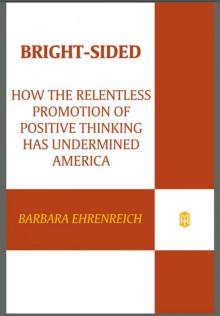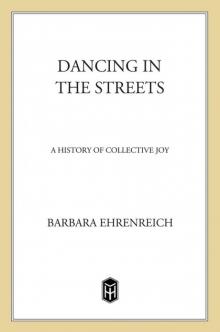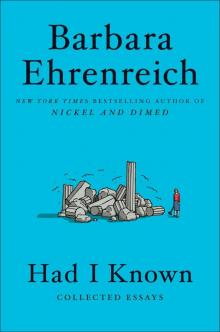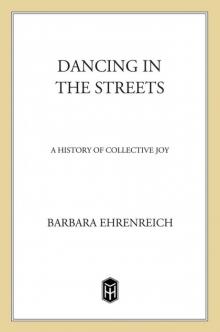- Home
- Barbara Ehrenreich
Had I Known Page 7
Had I Known Read online
Page 7
It turned out that Mr. Szekely, who is an ordained minister and does not drink, do drugs, or curse in front of ladies, did indeed have a warrant—for not appearing in court to face a charge of “criminal trespassing” (for sleeping on a sidewalk in a Washington suburb). So he was dragged out of the shelter and put in jail. “Can you imagine?” asked Eric Sheptock, the homeless advocate (himself a shelter resident) who introduced me to Mr. Szekely. “They arrested a homeless man in a shelter for being homeless.”
The viciousness of the official animus toward the indigent can be breathtaking. A few years ago, a group called Food Not Bombs started handing out free vegan food to hungry people in public parks around the nation. A number of cities, led by Las Vegas, passed ordinances forbidding the sharing of food with the indigent in public places, and several members of the group were arrested. A federal judge just overturned the antisharing law in Orlando, Florida, but the city is appealing. And now Middletown, Connecticut, is cracking down on food sharing.
If poverty tends to criminalize people, it is also true that criminalization inexorably impoverishes them. Scott Lovell, another homeless man I interviewed in Washington, earned his record by committing a significant crime—by participating in the armed robbery of a steakhouse when he was fifteen. Although Mr. Lovell dresses and speaks more like a summer tourist from Ohio than a felon, his criminal record has made it extremely difficult for him to find a job.
For Al Szekely, the arrest for trespassing meant a further descent down the circles of hell. While in jail, he lost his slot in the shelter and now sleeps outside the Verizon Center sports arena, where the big problem, in addition to the security guards, is mosquitoes. His stick-thin arms are covered with pink crusty sores, which he treats with a regimen of frantic scratching.
For the not-yet-homeless, there are two main paths to criminalization—one involving debt and the other skin color. Anyone of any color or prerecession financial status can fall into debt, and although we pride ourselves on the abolition of debtors’ prison, in at least one state, Texas, people who can’t afford to pay their traffic fines may be made to “sit out their tickets” in jail.
Often the path to legal trouble begins when one of your creditors has a court issue a summons for you, which you fail to honor for one reason or another. (Maybe your address has changed or you never received it.) Now you’re in contempt of court. Or suppose you miss a payment and, before you realize it, your car insurance lapses; then you’re stopped for something like a broken headlight. Depending on the state, you may have your car impounded or face a steep fine—again, exposing you to a possible summons. “There’s just no end to it once the cycle starts,” said Robert Solomon of Yale Law School. “It just keeps accelerating.”
By far the most reliable way to be criminalized by poverty is to have the wrong-color skin. Indignation runs high when a celebrity professor encounters racial profiling, but for decades whole communities have been effectively “profiled” for the suspicious combination of being both dark-skinned and poor, thanks to the “broken windows” or “zero tolerance” theory of policing popularized by Rudy Giuliani, when he was mayor of New York City, and his police chief William Bratton.
Flick a cigarette in a heavily patrolled community of color and you’re littering; wear the wrong-color T-shirt and you’re displaying gang allegiance. Just strolling around in a dodgy neighborhood can mark you as a potential suspect, according to Let’s Get Free: A Hip-Hop Theory of Justice, an eye-opening new book by Paul Butler, a former federal prosecutor in Washington. If you seem at all evasive, which I suppose is like looking “overly anxious” in an airport, Butler writes, the police “can force you to stop just to investigate why you don’t want to talk to them.” And don’t get grumpy about it or you could be “resisting arrest.”
There’s no minimum age for being sucked into what the Children’s Defense Fund calls “the cradle-to-prison pipeline.” In New York City, a teenager caught in public housing without an ID—say, while visiting a friend or relative—can be charged with criminal trespassing and wind up in juvenile detention, Mishi Faruqee, the director of youth justice programs for the Children’s Defense Fund of New York, told me. In just the past few months, a growing number of cities have taken to ticketing and sometimes handcuffing teenagers found on the streets during school hours.
In Los Angeles, the fine for truancy is $250; in Dallas, it can be as much as $500—crushing amounts for people living near the poverty level. According to the Los Angeles Bus Riders Union, an advocacy group, twelve thousand students were ticketed for truancy in 2008.
Why does the Bus Riders Union care? Because it estimates that 80 percent of the “truants,” especially those who are black or Latino, are merely late for school, thanks to the way that overfilled buses whiz by them without stopping. I met people in Los Angeles who told me they keep their children home if there’s the slightest chance of their being late. It’s an ingenious antitruancy policy that discourages parents from sending their youngsters to school.
The pattern is to curtail financing for services that might help the poor while ramping up law enforcement: Starve school and public transportation budgets, then make truancy illegal. Shut down public housing, then make it a crime to be homeless. Be sure to harass street vendors when there are few other opportunities for employment. The experience of the poor, and especially poor minorities, comes to resemble that of a rat in a cage scrambling to avoid erratically administered electric shocks.
And if you should make the mistake of trying to escape via a brief marijuana-induced high, it’s “gotcha” all over again, because that, of course, is illegal, too. One result is our staggering level of incarceration, the highest in the world. Today the same number of Americans—2.3 million—reside in prison as in public housing.
Meanwhile, the public housing that remains has become ever more prisonlike, with residents subjected to drug testing and random police sweeps. The safety net, or what’s left of it, has been transformed into a dragnet.
Some of the community organizers I’ve talked to around the country think they know why “zero tolerance” policing has ratcheted up since the recession began. Leonardo Vilchis of the Union de Vecinos, a community organization in Los Angeles, suspects that “Poor people have become a source of revenue” for recession-starved cities, and that the police can always find a violation leading to a fine. If so, this is a singularly demented fund-raising strategy. At a congressional hearing in June, the president of the National Association of Criminal Defense Lawyers testified about the pervasive “overcriminalization of crimes that are not a risk to public safety,” like sleeping in a cardboard box or jumping turnstiles, which lead to expensively clogged courts and prisons.
A Pew Center study found states spending a record $51.7 billion on corrections, an amount that the center judged, with an excess of moderation, to be “too much.”
But will it be enough—the collision of rising prison populations that we can’t afford and the criminalization of poverty—to force us to break the mad cycle of poverty and punishment? With the number of people in poverty increasing (some estimates suggest it’s up to 45 million to 50 million, from 37 million in 2007), several states are beginning to ease up on the criminalization of poverty—for example, by sending drug offenders to treatment rather than jail, shortening probation and reducing the number of people locked up for technical violations like missed court appointments. But others are tightening the screws: not only increasing the number of “crimes” but also charging prisoners for their room and board—ensuring that they’ll be released with potentially criminalizing levels of debt.
Maybe we can’t afford the measures that would begin to alleviate America’s growing poverty—affordable housing, good schools, reliable public transportation, and so forth. I would argue otherwise, but for now I’d be content with a consensus that, if we can’t afford to truly help the poor, neither can we afford to go on tormenting them.
A Homespun Safety Net
If nothing else, the recession is serving as a stress test for the American safety net. How prepared have we been for sudden and violent economic dislocations of the kind that leave millions homeless and jobless? So far, despite some temporary expansions of food stamps and unemployment benefits by the Obama administration, the recession has done for the government safety net pretty much what Hurricane Katrina did for the Federal Emergency Management Agency: It’s demonstrated that you can be clinging to your roof with the water rising, and chances are that no one will come to helicopter you out.
Take the case of Kristen and Joe Parente, Delaware residents who had always imagined that people turned to government for help only if “they didn’t want to work.” Their troubles began well before the recession, when Joe, a fourth-generation pipe fitter, sustained a back injury that left him unfit for even light lifting. He fell into depression for several months, then rallied to ace a state-sponsored retraining course in computer repairs—only to find those skills no longer in demand. The obvious fallback was disability benefits, but—catch-22—when Joe applied he was told he could not qualify without presenting a recent MRI scan. This would cost $800 to $900, which the Parentes do not have, nor has Joe, unlike the rest of the family, been able to qualify for Medicaid.
When Joe and Kristen married as teenagers, the plan had been for Kristen to stay home with the children. But with Joe out of action and three children to support by the middle of this decade, Kristen went to work as a waitress, ending up, in 2008, in a “pretty fancy place on the water.” Then the recession struck and in January she was laid off.
Kristen is bright, pretty, and, to judge from her command of her own small kitchen, capable of holding down a dozen tables with precision and grace. In the past she’d always been able to land a new job within days; now there was nothing. Like most laid-off people, she failed to meet the fiendishly complex and sometimes arbitrary eligibility requirements for unemployment benefits. Their car started falling apart.
So in early February, the Parentes turned to the desperate citizen’s last resort—Temporary Assistance for Needy Families. Still often called “welfare,” the program does not offer cash support to stay-at-home parents as did its predecessor, Aid to Families with Dependent Children. Rather, it provides supplemental income for working parents, based on the sunny assumption that there would always be plenty of jobs for those enterprising enough to get them.
After Kristen applied, nothing happened for six weeks—no money, no phone calls returned. At school, the Parentes’ seven-year-old’s class was asked to write out what wish they would ask of a genie, should one appear. Brianna’s wish was for her mother to find a job because there was nothing to eat in the house, an aspiration that her teacher deemed too disturbing to be posted on the wall with the other children’s.
Not until March did the Parentes begin to receive food stamps and some cash assistance. Meanwhile, they were finding out why some recipients have taken to calling the assistance program “Torture and Abuse of Needy Families.” From the start, the experience has been “humiliating,” Kristen said. The caseworkers “treat you like a bum—they act like every dollar you get is coming out of their own paychecks.”
Nationally, according to Kaaryn Gustafson, an associate professor at the University of Connecticut Law School, “applying for welfare is a lot like being booked by the police.” There may be a mug shot, fingerprinting, and long interrogations as to one’s children’s paternity. The ostensible goal is to prevent welfare fraud, but the psychological impact is to turn poverty itself into a kind of crime.
Delaware does not require fingerprints, but the Parentes discovered that they were each expected to apply for forty jobs a week, even though no money was offered for gas, tolls, or babysitting. In addition, Kristen had to drive thirty-five miles a day to attend “job readiness” classes, which she said were “a joke.”
With no jobs to be found, Kristen was required to work as a volunteer at a community agency. (God forbid anyone should use government money to let her stay home with her children!) In exchange for $475 a month plus food stamps, the family submits to various forms of “monitoring” to keep them on the straight and narrow. One result is that Kristen lives in constant terror of doing something that would cause the program to report her to Child Protective Services. She worries that the state will remove her children “automatically” if program workers discover that her five-year-old son shares a bedroom with his sisters. No one, of course, is offering to subsidize a larger apartment in the name of child “protection.”
It’s no secret that the temporary assistance program was designed to repel potential applicants, and at this it has been stunningly successful. The theory is that government assistance encourages a debilitating “culture of poverty,” marked by laziness, promiscuity, and addiction, and curable only by a swift cessation of benefits. In the years immediately after welfare “reform,” about one and a half million people disappeared from the welfare rolls—often because they’d been “sanctioned” for, say, failing to show up for an appointment with a caseworker. Stories of an erratic and punitive bureaucracy get around, so the recession of 2001 produced no uptick in enrollment, nor, until very recently, did the current recession. As Mark Greenberg, a welfare expert at the Georgetown School of Law, put it, the program has been “strikingly unresponsive” to rising need.
People far more readily turn to food stamps, which have seen a 19 percent surge in enrollment since the recession began. But even these can carry a presumption of guilt or criminal intent. Four states—Arizona, California, New York, and Texas—require that applicants undergo fingerprinting. Furthermore, under a national program called Operation Talon, food stamp offices share applicants’ personal data with law enforcement agencies, making it hazardous for anyone who might have an outstanding warrant—for failing to show up for a court hearing on an unpaid debt, for example—to apply.
As in the aftermath of Hurricane Katrina, the most reliable first responders are not government agencies, but family and friends. Kristen and Joe first moved in with her mother and four siblings, and in the weeks before the government came through with a check, she borrowed money from the elderly man whose house she cleans every week, who himself depends on Social Security.
I’ve never encountered the kind of “culture of poverty” imagined by the framers of welfare reform, but there is a tradition among the American working class of mutual aid, no questions asked. My father, a former miner, advised me as a child that if I ever needed money to “go to a poor man.” He liked to tell the story of my great-grandfather, John Howes, who worked in the mines long enough to accumulate a small sum with which to purchase a plot of farmland. But as he was driving out of Butte, Montana, in a horse-drawn wagon, he picked up an Indian woman and her child, and their hard-luck story moved him to give her all his money, turn his horse around and go back to the darkness and danger of the mines.
In her classic study of an African-American community in the late ’60s, the anthropologist Carol Stack found rich networks of reciprocal giving and support, and when I worked at low-wage jobs in the 1990s, I was amazed by the generosity of my coworkers, who offered me food, help with my work, and even once a place to stay. Such informal networks—and random acts of kindness—put the official welfare state, with its relentless suspicions and grudging outlays, to shame.
But there are limits to the generosity of relatives and friends. Tensions can arise, as they did between Kristen and her mother, which is what led the Parentes to move to their current apartment in Wilmington. Sandra Smith, a sociologist at the University of California, Berkeley, finds that poverty itself can deplete entire social networks, leaving no one to turn to. While the affluent suffer from “compassion fatigue,” the poor simply run out of resources.
At least one influential theory of poverty contends that the poor are too mutually dependent, and that this is one of their problems. This perspective is outlined in the book
Bridges Out of Poverty, cowritten by Ruby K. Payne, a motivational speaker who regularly addresses schoolteachers, social service workers, and members of low-income communities. She argues that the poor need to abandon their dysfunctional culture and emulate the more goal-oriented middle class. Getting out of poverty, according to Payne, is much like overcoming drug addiction, and often requires cutting off contact with those who choose to remain behind: “In order to move from poverty to middle class…an individual must give up relationships for achievement, at least for some period of time.” The message from the affluent to the down-and-out: Neither we nor the government is going to do much to help you—and you better not help one another, either. It’s every man (or woman or child) for himself.
In the meantime, Kristen has discovered a radically different approach to dealing with poverty. The community agency she volunteered at is Acorn (the Association of Community Organizations for Reform Now), the grassroots organization of low-income people that achieved national notoriety during the 2008 presidential campaign when Republicans attacked it for voter registration fraud (committed by temporary Acorn canvassers and quickly corrected by staff members). Kristen made such a good impression that she was offered a paid job in May, and now, with only a small supplement from the government, she works full time for Acorn, organizing protests against Walgreens for deciding to stop filling Medicaid prescriptions in Delaware, and, in late June, helping turn out thousands of people for a march on Washington to demand universal health insurance.
So the recession tossed Kristen from routine poverty into destitution, and from there, willy-nilly, into a new life as a community organizer and a grassroots leader. I wish I could end the story there, but the Parentes’ landlord has just informed them that they’ll have to go, because he’s decided to sell the building, and they don’t have money for a security deposit on a new apartment. “I thought we were good for six months here,” Kristen told me, “but every time I let down my guard I just get slammed again.”

 Nickel and Dimed: On (Not) Getting by in America
Nickel and Dimed: On (Not) Getting by in America Living With a Wild God
Living With a Wild God Bright-Sided
Bright-Sided Bait and Switch: The (Futile) Pursuit of the American Dream
Bait and Switch: The (Futile) Pursuit of the American Dream Dancing in the Streets: A History of Collective Joy
Dancing in the Streets: A History of Collective Joy Had I Known
Had I Known Witches, Midwives, and Nurses
Witches, Midwives, and Nurses For Her Own Good: Two Centuries of the Experts Advice to Women
For Her Own Good: Two Centuries of the Experts Advice to Women Nickel and Dimed
Nickel and Dimed Dancing in the Streets
Dancing in the Streets Bait and Switch
Bait and Switch